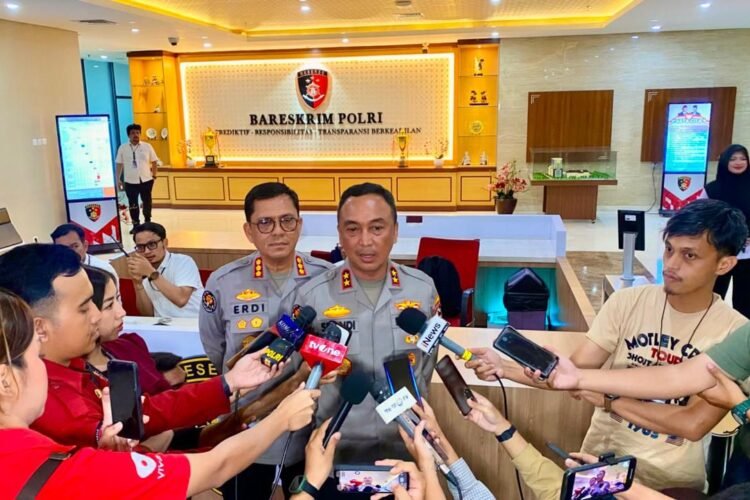
Strengthening the National Police through Optimizing Attached Supervision
Efforts to build the police force so that it continues to improve need to be strengthened, including by optimizing internal supervision within the institution.
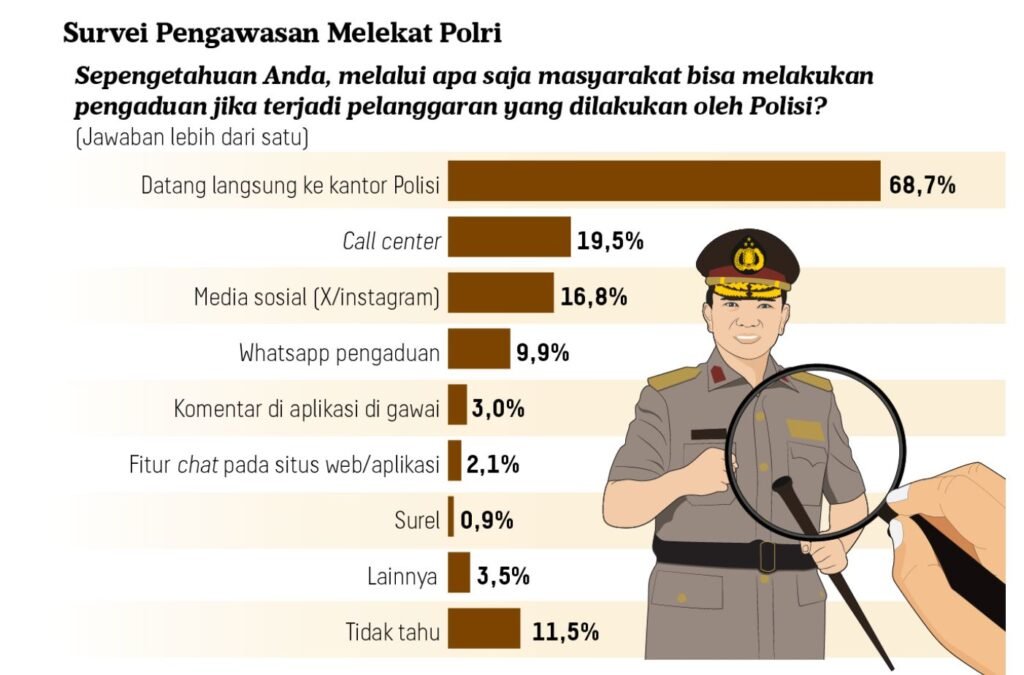
The following article was translated using both Microsoft Azure Open AI and Google Translation AI. The original article can be found in Penguatan Polri Melalui Optimalisasi Pengawasan Melekat
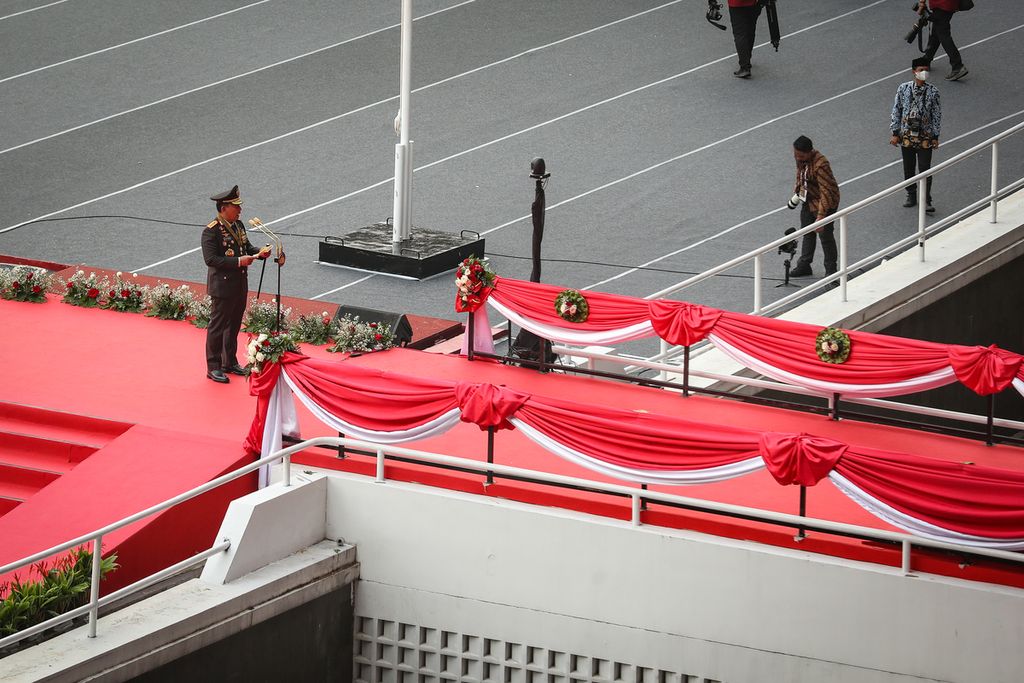
National Police Chief General (Pol) Listyo Sigit Prabowo makes a speech at the 77th anniversary ceremony of Bhayangkara at Gelora Bung Karno UtamaStadium, Jakarta, Saturday (1/7/2023).
Polri as a law enforcement agency which is also tasked with protecting, serving and protecting the public is required to consistently present officers who are responsible and uphold professionalism. Efforts to build the Bhayangkara Corps so that it continues to improve need to be strengthened, including by optimizing attached supervision within the institution.
The Indonesian National Police (Polri) continues to strive for the best in carrying out its great mandate for the nation and state. Referring to Law Number 2 of 2002 concerning the National Police, it is explained that the police have main duties and functions which include law enforcement (gakkum), maintaining security and public order (harkamtibmas), as well as protection, service and protection (linyanyom) of the community.
The complexity of tasks and functions that must be carried out by the police force will certainly face various challenges. Various obstacles in social space when dealing with the general public, as well as issues that arise related to the internal institution, are inevitable and require strategic steps to improve.
In the internal institutional context, one form of Polri’s commitment to maintaining and continuing to optimize the performance of responsible and professional ranks is by implementing inherent supervision or abbreviated as waskat. The emphasis on carrying out waskat within the National Police organization is contained in the National Police Chief’s Regulation (Perkap) Number 2 of 2022 concerning Attached Supervision.
Close supervision, as an effort to ensure the process, results, and evaluations can be in accordance with the plan, has been commonly applied in managing state institutions. The term close supervision first appeared in Presidential Instruction No. 15 of 1983 regarding Guidelines for Implementation of Supervision and Presidential Instruction No. 1 of 1983 regarding Guidelines for Close Supervision.
In the regulation it is stated that the term “embedded supervision” refers to a series of continuous control activities directly carried out on subordinates, in order to ensure effective and efficient implementation of their tasks in accordance with the plans and prevailing laws and regulations.
Regarding the embedded supervision, particularly explained through the decision of the Minister of State Apparatus Empowerment. Embedded supervision, according to the Minister of State Apparatus Empowerment Decision Number KEP/46/M.PAN/2004 on Implementation Guidelines for Embedded Supervision in Government Administration, is equivalent to the management control or internal control.
In more detail, the minister’s decision also explains that waskat is any effort made in an organization to direct all activities so that the organization’s goals can be achieved effectively, efficiently, and economically, all resources are utilized, protected, data and reports can be trusted and presented reasonably, and all applicable regulations are followed.
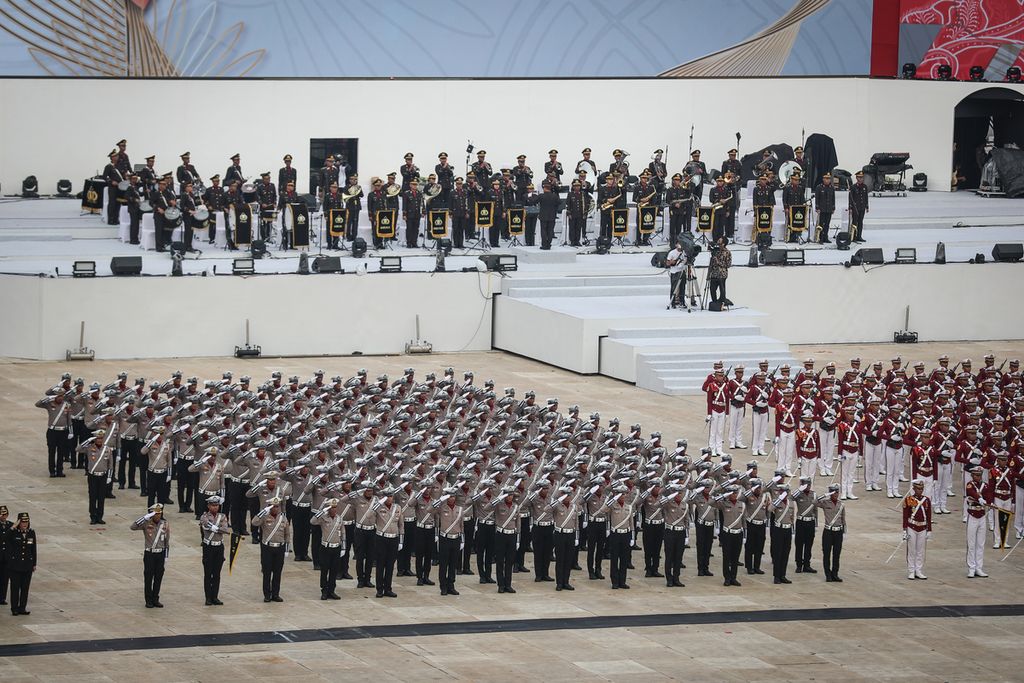
Police officers participate in the commemoration ceremony of the 77th anniversary of Bhayangkara at the main stadium of Gelora Bung Karno, Jakarta, on Saturday (1/7/2023).
Waskat implementation
The implementation of accountability in the Indonesian National Police is based on Police Regulations No. 2/2022, which covers five main aspects. These activities include guidance, inspection, assistance, supervision, and/or monitoring, as well as evaluation. The regulation also explains that accountability activities can be conducted either directly or indirectly. Direct accountability is carried out through face-to-face interaction, while indirect accountability utilizes information technology.
Based on Perkap No 2/2022, it covers five main aspects. These activities include directives, inspections, assistance, supervision, and/or monitoring as well as evaluation.
The meaning behind the implementation of “waskat” in the work organization of the Indonesian National Police (Polri) is essentially to maintain and cultivate a sense of responsibility among each personnel to behave and serve as Bhayangkara Corps that meet the expectations of all parties, including the community. The interpretation of “waskat” within Polri is not much different, essentially encompassing all actions and activities by superiors that are continuously carried out to direct and control subordinates in order to prevent any misconduct by Polri civil servants.
In this regard, the National Police, in collaboration with Research and Development (R&D) Kompas, conducted a study to determine the extent to which the quality of implementation of embedded supervision has been carried out at the level of all regional units (satwil). This research uses the process of collecting and analyzing data from face-to-face surveys of the community.
The research coverage focuses on five aspects of waskat, both in prevention efforts, development, and follow-up when there are violations by members of the Police. However, the quality of the implementation of waskat within the Polri institution will be reflected by the main tasks and functions that include law enforcement, public order, and security, as well as community outreach.
The results of a face-to-face survey conducted with 100 respondents in each Police Regional Office (Polda) area, with a total of 3,400 respondents from the general public, show a very positive achievement for the performance of Polri (Indonesian National Police). On average, no less than 87.8 percent of the public expressed satisfaction with the performance displayed by the Polri.
The performance of the Indonesian National Police (Polri) in serving the public has received the highest appreciation. Nine out of ten respondents agreed to express their satisfaction with the services provided by the Polri to the community. Not far different, the task of the Polri in maintaining security and order is also assessed very positively by the public. More than 89 percent of respondents agreed to express their satisfaction with the efforts of the Polri in maintaining security and order.
Meanwhile, regarding law enforcement, it has received a positive response and evaluation from the community. Four-fifths of the respondents expressed their extreme satisfaction with the law enforcement conducted by the police.
The high level of public appreciation in the evaluation of police performance is proof that the commitment to bring police personnel who uphold professionalism continues to be carried out. What is reflected in the performance shown by the police should also be a form of confirmation that efforts to improve, including inherent oversight within the institution, have been carried out effectively. Furthermore, the results of public surveys also highlight the issue of oversight carried out in order to prevent and follow up on violations by police officers, one of which is reflected in the service of complaints from the community.
When asked how the public could make a complaint if a violation was committed by the police, the majority of respondents (68.7 percent) stated that a complaint could be made by going directly to the police station. In the multiple response model, apart from coming directly to the police station, around a fifth of respondents answered complaints through the National Police’s call center service. Then there were around 16.8 percent of respondents who chose to make complaints via social media.
The survey of the public also noted several aspects of the complaint reporting services that need improvement. The complaint response and ease of access to complaint services received the highest attention from around two-fifths of the responding public. In addition, one-third of the other members of the public hope for improvements in the transparency of the complaint process.
In this case, in addition to the ease of access at the initial complaint process, the public also seems to expect that the complaint process will continue to be well-informed and open. However, overall, public appreciation is high, reaching no less than 85 percent of respondents stating satisfaction with the complaint service for violations committed by members of the National Police force.
In order to improve public access to the reporting of violations committed by personnel, the Head of the Professionalism and Security Division (Kadiv Propam) of the Indonesian National Police, General Syahar Diantono, explained that the police have introduced an integrated web-based complaint application.
“To make it easier for the public to make complaint reports, we from the Itwasum Supervision Work Unit, Propam Div and Wasidik Bureau have created online, complaint applications, namely Dumas Presisi, Whatsapp Yanduan, and E-Wasidik so that people don’t have to go far “It’s a long way to come to the police station to make a complaint,” explained Inspector General Syahar Diantono to Kompas on December 24 2023.
In addition, a public survey conducted from October 22 to November 15, 2023 also measured public perception regarding the implementation of supervision in the Polri institution. In terms of whether respondents have ever known or directly experienced violations committed by police officers, only about 8.7 percent of respondents answered that they have had such an experience.
From the group of respondents, the majority or one-fifth of the respondents answered that the form of violation that ensnared the police officers they knew was in the form of drug abuse to physical violence. As for the follow-up action against police violations, around 56.3 percent believed that the follow-up process for violations committed by Polri personnel had been carried out. Conversely, about one-quarter of respondents stated otherwise, where according to this group of respondents the follow-up process of the violations that occurred had not yet been carried out.
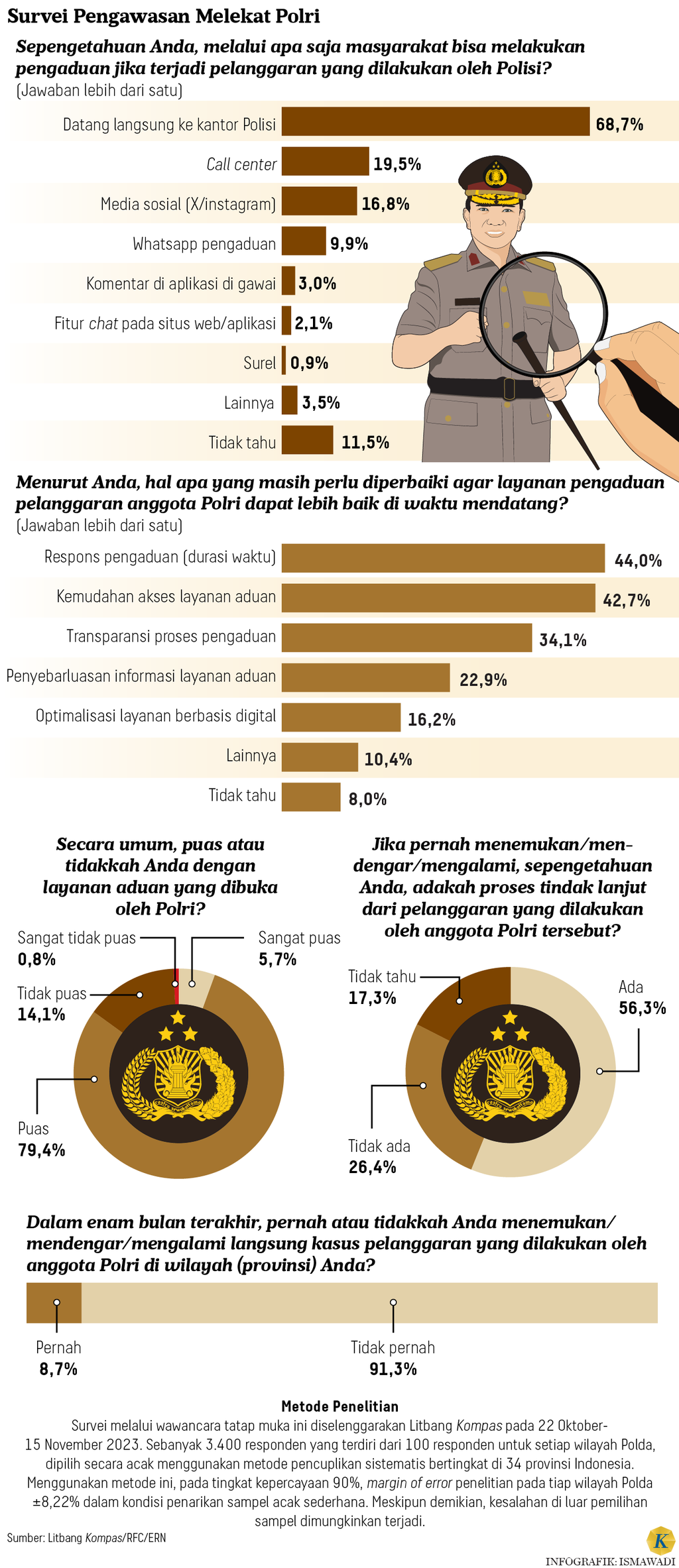
Waskat optimization
The implementation of the ‘waskat’ in the Polri organization still requires several improvements, even though the overall realization can be said to have been successful. A number of improvements have been noted, providing input for the evaluation and recommendations for Polri in the future, particularly in the implementation of the ‘waskat’ in the future.
Academician and Chairman of the Global Strategic Doctoral Program at the University of Indonesia, Dr. A Hanief Saha Ghafur, stated that mapping the gaps in policy implementation needs to be done. This is because it is very important and fundamental to evaluate the policy and implementation of the Polri Waskat that has been carried out.
Is there still a regulation that allows police to commit abuse? (Hanief Saha Ghafur)
Efforts to optimize fundamental security measures need to focus on strengthening regulations. The reformulation for the improvement of the Indonesian National Police Chief Regulation Number 2 of 2022 concerning Embedded Supervision needs to emphasize more on the technical aspects of implementation. In addition, the execution of security measures must be carried out with a risk management analysis and a social culture characteristic-based scientific study.
Another thing that is also important to note about the implementation of waskat in the National Police institution is improving supervision from a human resources, managerial and organizational perspective. This is focused on a number of things, such as the formation of special teams, strengthening aspects of leadership (commander wish) at the work unit and regional unit levels, including the example that needs to be shown by all leaders in police ranks. The application of waskat also needs to be implemented from the recruitment period and is integrated into the education curriculum for Polri members.
Meanwhile, based on research findings related to waskat, practitioners and experts in the field of human resources development (HRD), Pungki Purnadi, in a discussion forum with Litbang Kompas on Monday (11/12/ 2023) highlights another aspect that also needs to be considered as an effort to optimize waskat, namely integrating monitoring and evaluation by utilizing digital channels owned by the National Police, such as Super Apps. Utilizing sophisticated technology and information for controlling systems in the implementation of waskat will make it much easier and more efficient.
The optimization of the implementation of waskat is intended to maintain the commitment of the Indonesian police force (Polri) in bringing about a “Precise” Polri. Regarding the importance of improvement and the enhancement of the implementation of the Polri’s waskat, Irjen Syahar Diantono believes that it is oriented not only towards the internal of the Polri institution, but also to the broader public interest. According to him, Polri must be able to provide a sense of fairness in law enforcement, openness in service, as well as a sense of security and maintaining order.
The results of this public survey are a high appreciation from the community to the Indonesian National Police institution under the leadership of Police General Listyo Sigit Prabowo, who always emphasizes to his subordinates to always set a good example. (Syahar Diantono)
“We (the Indonesian National Police) will continue to do our best to ensure that the public is always protected, cared for, and served well. The public survey results are a high appreciation from the community towards the institution of the Indonesian National Police under the leadership of General (Pol) Listyo Sigit Prabowo, who always emphasizes to the staff to always provide a role model in work and provide benefits for the community, nation, and country,” said Inspector General Syahar Diantono. (LITBANG KOMPAS)




